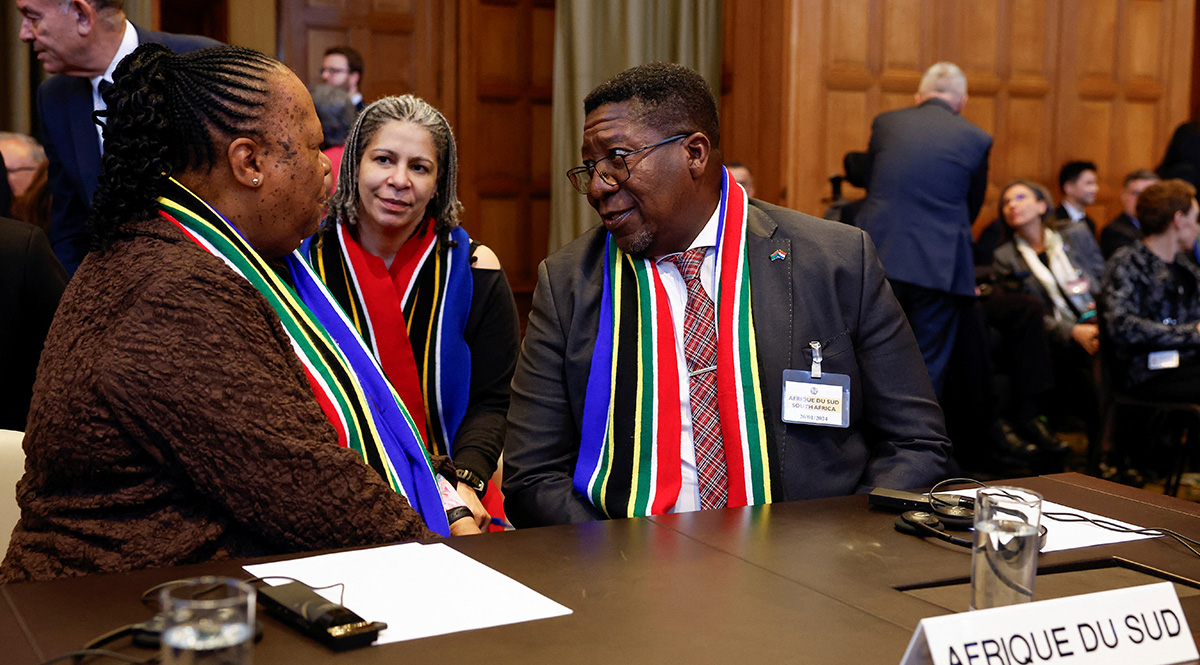Israel Ordered to Prevent Genocide in the Gaza Strip
In an order on provisional measures dated 26 January, the International Court of Justice (ICJ) ordered Israel to prevent acts of genocide in the Gaza Strip and to improve the humanitarian situation there. In doing so, it partially granted the request by South Africa in the proceedings it initiated against Israel at the end of December 2023. However, the order does not mean a cessation of hostilities or an end to the case, with the differing assessments of it providing further evidence that the international community’s attitudes towards the Israeli-Palestinian conflict will continue to be divided for at least a few more years.
 PIROSCHKA VAN DE WOUW / Reuters / Forum
PIROSCHKA VAN DE WOUW / Reuters / Forum
What does the case concern and why is South Africa accusing Israel in court?
South Africa argues that Israel has been committing genocide against the Palestinians living in the Gaza Strip during the military action taken in response to the Hamas terrorist attack of 7 October 2023. Evidence of this is said to include statements by Israeli politicians and military officers. Jurisdiction is based on the 1948 Convention on the Prevention and Punishment of the Crime of Genocide, which is one of the few treaties that allows proceedings to be brought before the ICJ against another state without its explicit consent.
The South African authorities are seeking to improve the situation of Gaza’s civilian population (with which a large part of the population is sympathetic) and to mark their opposition to Israel’s policies towards the Palestinians, which it has compared to apartheid in South Africa that lasted until 1994. They may also hope to increase support for the ruling ANC party in the May 2024 general elections; however, their actions are also consistent with the long-standing
pro-Palestinian policy in place since Nelson Mandela’s presidency that helps South Africa to manifest leadership among developing countries, which have largely criticised Israel’s actions in Gaza.
What did the ICJ rule?
In addition to initiating proceedings to establish whether genocide indeed has occurred in the Gaza Strip in recent months (to be decided in a few years at the earliest), South Africa demanded that the ICJ adopt a legally binding order as soon as possible to stop the crimes it claims are taking place. South Africa expected the order to include an immediate cessation of hostilities, for Israel to take measures to prevent possible acts of genocide and prevent the destruction of evidence of such crimes, and to report back to the Court within a week on the steps taken to implement its decision. In its 26 January order, the ICJ took into account most of the demands, but did not prohibit Israel from continuing its operations in Gaza and gave it a month to submit its report. It demanded that immediate and effective measures be taken to provide basic services and humanitarian assistance to Palestinians living in the Gaza Strip. The order does not resolve the case, but it indirectly signals that genocide may have occurred, as it is issued if the allegations are found to be plausible.
What has Israel and the international community said about the order?
Israeli Prime Minister Benjamin Netanyahu denied the genocide accusations and expressed satisfaction that the ICJ did not order a cessation of hostilities. However, National Security Minister Itamar Ben-Gvir and Defence Minister Yoav Galant, among others, went further and criticised the court’s decision as “anti-Semitism”. The South African authorities, Palestinian Foreign Minister Riyad al-Maliki, and Hamas representatives were pleased with the decision but expressed disappointment that the ICJ did not order a halt to the fighting. Many developing and some developed countries and the EU announced that they expect Israel to fully implement the order.
In the ICJ proceedings, Israel is supported by the U.S., the UK, France, Germany (which has even declared its intention to join the case on the Israeli side) and Austria, Czechia, Hungary, and others. South Africa is supported by most developing countries, the Organisation of Islamic Cooperation, the Arab League, and the Non-Aligned Movement, as well as by European states Belgium, Spain, Ireland, Slovenia, and some others (hence the lack of a unified EU position on the main plea in the case).
What is Poland’s possible response?
The ICJ order means that acts of genocide may have occurred or still are occurring in the Gaza Strip. As a party to the 1948 Convention, Poland is forbidden to act in any way that supports genocide. It would therefore be advisable to review military cooperation with Israel from this point of view and to abandon, for example, any transfer of arms until the military action in Gaza has ended.
In addition, it would be desirable to consider the need for and scope of Poland’s involvement in the proceedings in the present case and in the independent proceedings for an advisory opinion by the ICJ concerning Palestine initiated at the request of the UN General Assembly in early 2023. It is also possible to join the appeals of some countries (e.g., Chile, Mexico, South Africa) to the International Criminal Court to act more decisively on the situation in Palestine. This consideration should take into account relations with Israel, Palestine, the U.S., developing countries, as well as Poland’s support for international law as the basis of the current international order, declared for many years. At the same time, it would be advisable at least to refrain from criticising the ICJ’s decision, as on the basis of the same 1948 Convention, an analogous measure—but ordering a cessation of hostilities—was issued by the ICJ in March 2022 in the case of Ukraine v. Russia, in which Poland is one of the countries intervening on the side of Ukraine.





